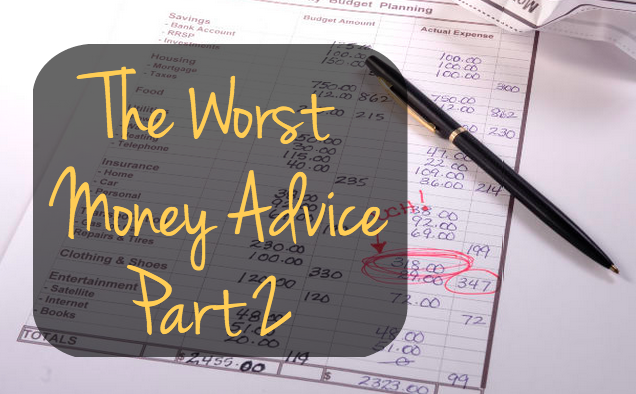Last week, we shared three of the very worst piece of financial advice we’ve ever heard. However, they were all generally broad and we didn’t touch upon any specific kind of advice regarding investing, retirement and life planning. This week, we’ll cover three more “worsts” that are related to these types of financial moves.
“Cash in on your retirement savings to pay off your credit card”.
Our first reaction to this was a loud guffaw, but was followed by a very simple, “how about no?”. Your retirement savings should not be touched until you, well, retire! That’s what it’s there for. Don’t forget that there’s usually a penalty to “cash in” on your retirement savings before a certain age as well (each financial institution is different), not to mention the extra income tax you will have to pay on that quick “surge” of extra money. If it’s substantial, it could bump you into another tax bracket.
While there are exceptions to this rule, unless you have an enormous and very uncommon interest rate on your credit card (30% or more), weigh your options carefully before pulling out retirement income. You’ll lose that piece of mind, and you cannot go back in time to re-earn that nest egg.
The best thing to do is to meet with a financial advisor and create a very well structured credit card repayment plan to manage your debt. If your debt is out of control, talk to your credit card company. They’re generally very willing to work with you so long as you keep your end of the agreement.
“Want to get your cash flow going? Buy a house and rent it out. Set the monthly rent to whatever your mortgage payment is”.
We hear this one a lot, however this is only somewhat bad advice because it makes the prospect of being a landlord sound like an easy way to becoming rich quickly. While owning an additional property and renting it can be a very decent investment, many people go into the situation having no idea how time consuming the job is, not to mention how difficult and stressful it can be. It’s essentially a full time job. Not all tenants are wonderful; some cause a lot of damage and may cost you more in the long run. It’s a high-risk game, so unless you know someone personally who would rent from you or have excellent references, consider other options before owning a renting property.
Should you go down that path, however, put aside what industry professionals call a “sinking fund”. A sinking fund is money for the rainy day expenses – re-carpeting, re-painting, professional cleaners, damage repair, etc”. Don’t expect the monthly rent to cover this, you have to be prepared before anything goes wrong in the first place…and it can. Also, be prepared to cover at least 6 months of rent on your own should you have a tenant that skips on their rent, or leaves without advanced notice. Prepare for late payments as well. Bottom line is if you are depending on renting income to survive, rethink the entire venture all together.
“A payday loan is always a bad idea. Those companies are all sharks”.
You knew this was coming eventually! We make it no secret that we’re in this industry to change how it’s viewed by the general public. We don’t deny that it’s earned it’s reputation. However, with the changing economic climate more people are finding they need access to short-term, low-value loans. They either cannot be approved for credit, but otherwise have excellent income and repayment history. For whatever reason, they need alternative lending options when their bank can’t help them.
A payday loan, when used responsibly, can help alleviate significant and unforeseen financial burdens. They run the risk of becoming dangerous or userous when a lender does not finance responsibly. Thankfully, we have excellent regulations in Ontario that not only put a cap on the fees that a lender can charge, but they also prevent the notorious rollover loan (that gets consumers into a cycle of debt).
We’re tooting our own horn, this is true, but some of that has to be done! Come check out how GoDay.ca is different today, or you know, whenever you hit a cash flow shortage.
We’ll be here.



